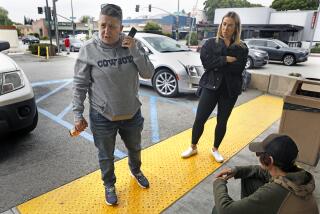Survivor Helps Others Find Hope in Hospital
Before paramedics pulled a comatose Christina Kopaczewski out of a wrecked car last year, they thought she was dead.
A pickup truck had struck the car in which the 17-year-old Westminster High School senior was riding, spinning the vehicle around and sending it up over a curb and through a block wall.
At UCI Medical Center in Orange, John and Vi Kopaczewski learned the extent of their daughter’s injuries: Her jaw was broken in three places, her clavicle was broken, her pelvis was shattered, her bladder and an ovary were ruptured and her brain was bruised. Then the head trauma team doctor told them the worst news of all: There was no way of telling when--or if--their daughter would ever come out of the coma.
That, says John Kopaczewski, “was the most devastating thing I had ever heard in my life.”
Kept Positive Attitude
But through it all--even when Christina suffered a minor stroke--the Kopaczewskis prayed and maintained a positive attitude, refusing to accept their daughter’s negative prognosis. And when Christina woke up after 13 days in the coma, they say, it was like a miracle.
Forty-nine days after the accident, on March 3, 1985, Christina was released from the hospital.
But that wasn’t the last the nurses and respiratory technicians at UCI Medical Center would see of Christina.
Since then, Christina and her mother have made scores of return visits to the hospital to see the people who, they say, have become like family members. And, from the beginning, they have volunteered to be on call to talk to patients in intensive care and family members who might need emotional support, a kind word and visible reassurance that, even in the worst cases, there is hope.
The Kopaczewskis are, in a word, grateful.
“We feel there is no way we could ever repay these people,” Kopaczewski, owner of an office and home cleaning service, said in an interview at his Garden Grove home.
“I guess we feel an obligation for what they did for our daughter,” said Vi Kopaczewski. “We don’t even know what some of their names are, but we still go up to them and give them a big hug and a kiss.”
“The nurses are like good friends to me,” said Christina, a petite 18-year-old, speaking in a low, husky voice that, her friends say, sounds like Lauren Bacall. Her voice, made husky by the stroke that paralyzed her left vocal cord, turns to a hoarse whisper when she talks too much.
Learned to Walk Again
Now 18 and working full time as a salesperson at Best Products in Westminster, Christina underwent six weeks of physical therapy to learn how to walk again. She has a minor problem with her memory and has had to give up playing contact sports because, she says, “if I fall again I have a chance of re-breaking my hips.” She also wears braces, the result of her teeth having shifted since the accident.
“Usually the day you’re released from the hospital, that’s the last time they see you,” said Christina. “I can’t understand why people don’t come back to visit. As far as I’m concerned, they’ve helped me achieve where I am today. I am so thankful to them.”
“She doesn’t realize what all went on,” her mother said. “That’s one reason I enjoy going back there. Everyone at the hospital is so compassionate.”
“That,” added John Kopaczewski, “is why we gave the party.”
“The party” is the all-day bash the Kopaczewskis threw in January at Los Alamitos Country Club as a way of thanking the hospital staff. About 75 doctors, nurses and technicians showed up for the party which, in order to accommodate the different shifts at the hospital, began at 10 in the morning and didn’t end until 10 at night.
Guests ‘Just Amazed’
“It was very exciting just to see them all there at one time,” Vi Kopaczewski said. “They said no one has ever done anything like that. They were just amazed.
“For me,” Christina said, “it was exciting because I was out of it for so long in the hospital. I got to meet a lot of people I didn’t know, like the paramedics. If they hadn’t been there in the split second they were, I wouldn’t be here right now.”
John and Vi Kopaczewski believe the positive attitude they maintained throughout the ordeal played a major role in Christina’s recovery.
From the first day--when their comatose daughter’s face was so swollen they could barely recognize her--the Kopaczewskis decided that “no one would go in the room with negative thoughts.” Vi Kopaczewski said they instructed relatives that “when you go in, go up to her and talk to her like she’s awake. Say nice things to her, not ‘Poor baby.’ ”
Some relatives, she acknowledged, simply couldn’t handle seeing Christina and had to leave the room.
But the Kopaczewskis, who stayed by their daughter’s bedside around the clock for 16 days straight, continued to act as normal as possible.
Played Her Favorite Music
They brought in a radio with earphones for Christina and played her favorite music. Christina’s brother, John Jr., 22, would talk to her and rub her legs and back. And, as she did when Christina was younger, Vi Kopaczewski would say to her: “You’ve been sleeping enough, you lazy bum. Don’t you think it’s time to wake up?”
Vi Kopaczewski also would talk to her daughter, reassuring her that her face was OK. Christina, a former Miss Teen Anaheim Globe who was considering going into modeling, had always been fussy about her appearance, her mother explained.
“The nurses used to get a big kick out of the way I talked to her and they said, ‘She can’t hear you,’ ” Vi said, smiling at the memory.
Her husband added: “There was no way anyone could make me believe the positive attitude was not part of her recovery.”
A week after Christina came out of the coma, the nurses in the intensive care unit, impressed by the family’s positive attitude and hands-on care of their daughter, asked if they would talk to a couple who was having a hard time coping with their 13-year-old daughter’s being in a coma.
“We explained to them what Christina’s condition had been, what we had done, and the positive attitude we had,” Vi Kopaczewski said.
After Christina was released from the hospital and was returning three times a week as an outpatient, her mother told the intensive care nurses: “If we can be of support to anyone, we’d be more than happy to.”
Talked to Many
Since then, she and Christina have talked to numerous patients and families of patients, many of them young people who, like Christina, have been in car accidents.
The Kopaczewskis say they simply want to help make the families feel at ease, to show them that, as Christina says, “no matter how bad it is, they can come out of it very well: Don’t expect the worst, always expect the best.”
The one word that crops up most frequently when talking about the Kopaczewski family to nurses in UCI Medical Center’s surgical intensive care unit is “special.”
“The family was just totally involved with the care,” nurse Gina Ginther said. “The hands-on approach they took from the beginning of the care was just phenomenal, and we feel that is probably one of the main reasons Christina had such a miraculous recovery.”
Ginther said she doesn’t often use the term “miraculous” in a medical context. But, she said, “from a human standpoint, you’ve got to admit there was something more going on here.”
“Christina had a very negative prognosis, and her family would not accept that,” said Terry McAlester, assistant nurse manager in the surgical intensive care unit and recovery room. “To this day, I’d say they really loved her right back into her own good health.”
‘Filled With Love’
“It’s a family filled with love not just for their own family but for everybody,” she added. “They honest-to-God care . They have given me their phone number, and I can call them about special needs a family might have.”
McAlester said the Kopaczewskis are “devastated by the tragedies” they come in contact with at the hospital, but “they’re willing to take a chance and make themselves vulnerable.”
“They have so much hope to give,” she said. “When everything is looking real grim, they never give up.”
“We’ve called them at all times of the day and night,” Ginther said. “They’ve sat here hours with the families in silence or talked to them. They’ve done anything they can to show that there is hope.”
Although Christina recently completed her last outpatient visit to UCI Medical Center, she and her mother have no intention of stopping their now twice-a-month regular visits with the nurses and respiratory technicians.
They simply can’t seem to thank them enough.
At the thank-you party the Kopaczewskis threw in January for the hospital staff, a neurosurgeon exclaimed to John Kopaczewski: “I can’t believe this!”
For the Kopaczewskis, however, it’s not hard to understand.
As Christina’s father told the surgeon: “You gave us back the most precious thing we own.”
More to Read
Sign up for Essential California
The most important California stories and recommendations in your inbox every morning.
You may occasionally receive promotional content from the Los Angeles Times.










